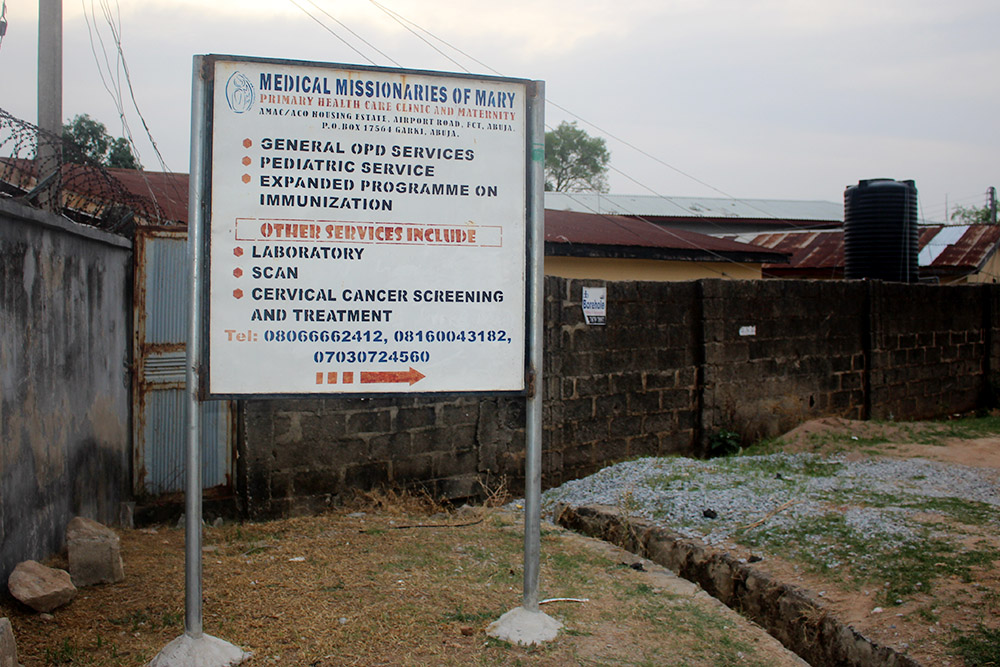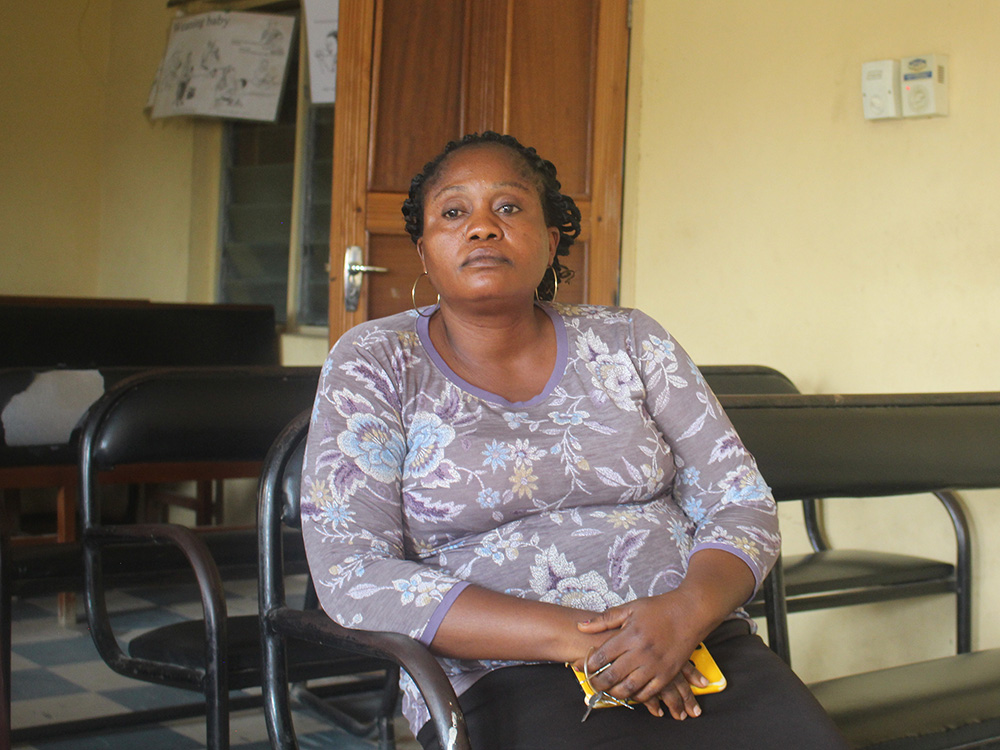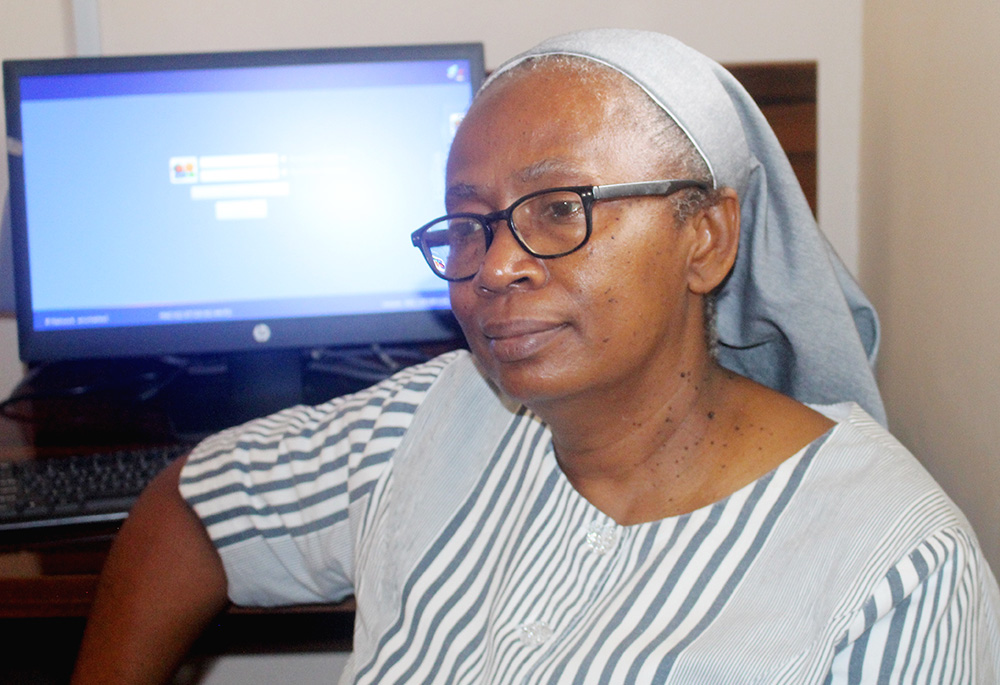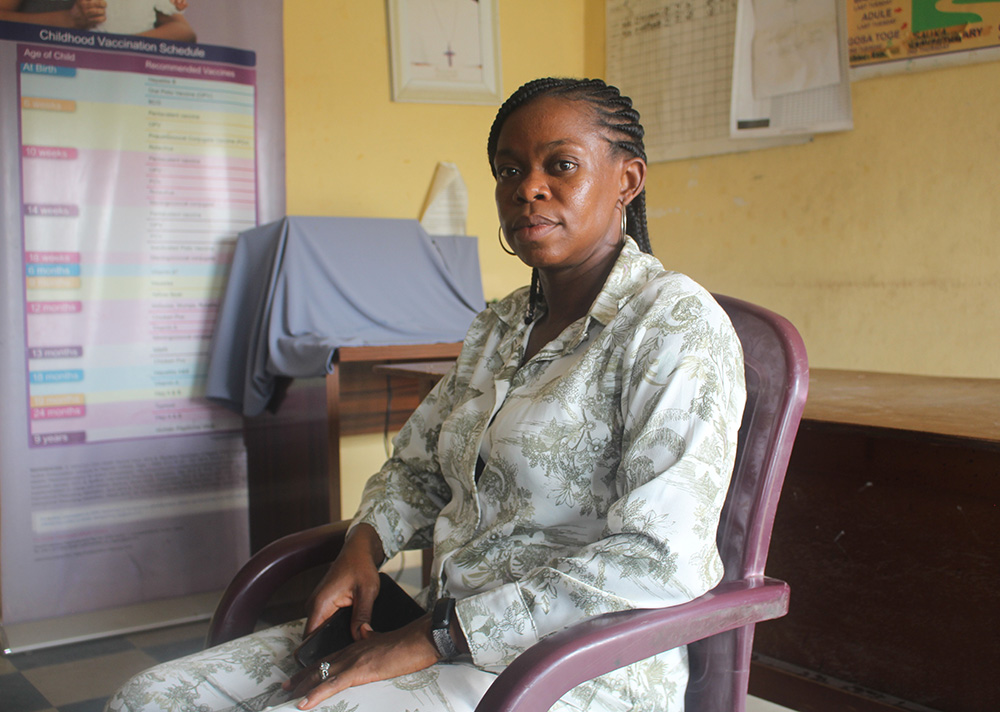
A signpost near the clinic's entrance informs the public about the Medical Missionaries of Mary's health care services in Lugbe, Abuja, Nigeria. (GSR photo/Valentine Benjamin)
Until the day in July 2018 when news broke of a woman who died from cancer on her street, 49-year-old Funmi Olowookere didn't know much about cancer. She didn't have access to adequate information about it in the media, she didn't hear about it from her friends or family, and she had never had the opportunity to learn about it from a health professional.
So, when sisters from the Medical Missionaries of Mary in Abuja, Nigeria's capital city, offered free breast and cervical cancer screening for indigent women in Abuja, she quickly took advantage of it. "I was booked for a screening test and some drugs were recommended for me," Olowookere told GSR.
She was told that she had an infection caused by her use of an intrauterine contraceptive device (IUD), which, according to a new study, could predispose her into developing breast cancer. After being told to remove the IUD, Olowookere went back to the hospital and discovered that the infection had disappeared upon removal.
Olowookere learned that breast self-examinations and screenings are important aspects of maintaining good health and preventing cancer in women, "especially when you are above 40 years of age."

Funmi Olowookere at the the Medical Missionaries of Mary's clinic in Lugbe, Abuja, Nigeria (GSR photo/Valentine Benjamin)
Africa's growing cancer epidemic is troubling, particularly as it competes with the continent's other health care needs, according to a 2022 Lancet Oncology Commission report. According to the report, Africa's cancer deaths are expected to more than double by 2040, reaching roughly 1.4 million deaths annually.
Breast cancer is the most common cancer worldwide, and in developing countries like Nigeria, it is a major killer. Part of the problem is that most women present their cases at a late stage, largely due to a lack of awareness. People often think that cancer is a disease for the elderly, and even when they seek treatment, poor equipment and underfunded facilities prevent rapid diagnosis and treatment.
Nigeria, Africa's most populous country, has one of the highest cancer mortality rates in the world, with an estimated 78,899 deaths due to cancer in 2020.
Elsewhere in the world, the mortality rate for the disease has fallen — such as in the U.S., where it has gone down 33% in the last three decades.
Advertisement
Nigeria is largely challenged with poor infrastructure, which leaves the country's health care system underfunded (only 4-6% of its federal budget is allocated to health).
Mass emigration of skilled medical practitioners makes things worse. The country has fewer than 90 clinical oncologists to more than 100,000 cancer patients across only nine cancer treatment centers — with only four radiotherapy machines in the country.
Sisters of the Medical Missionaries of Mary run a primary health care and maternity clinic to complement the national health system as collaborators, advocating for the marginalized and poor across more than 20 villages in Abuja.
The nuns and their clinic developed the intervention in 2015 when they realized that the combination of poverty and lack of information made breast and cervical cancer that much more fatal. Though they initially launched the screenings free of charge, after about two months the Medical Missionaries of Mary could no longer sustain the project for free. Now, they can only offer their services for free depending on outside funding.

Sr. Theresa Agbam, lead coordinator for the Medical Missionaries of Mary's cancer program (GSR photo/Valentine Benjamin)
Medical Missionaries of Mary Sr. Theresa Agbam, lead coordinator for the cancer program, said it focuses primarily on cervical cancer because it's more fatal than breast cancer, with the sisters offering pap smears and cervical screenings.
"Both cancers unfortunately have very high prevalence in Nigeria," Agbam said. "Breast cancer is more prevalent, but cervical cancer has a higher mortality. Once [cervical cancer] spreads, it's very difficult to treat: It's a 50-50 chance for women," despite being preventable.
"If you are not screening to find the pre-cancer, then those women are just out there continuing to progress with the disease until they get to cancer stage, and then it's too late," she said.
Unlike Olowookere, Chidinma Nnadi knew of cancer and had heard of people who died from it. A mother of four, she learned about a free screening when the sisters visited her local church in Abuja after a Sunday Mass in July 2020.

After benefiting from the Medical Missionaries of Mary's cancer awareness program in Lugbe, Abuja, Nigeria, Chidinma Nnadi passed her knowledge of self-breast examination to other women around her. (GSR photo/Valentine Benjamin)
"When I heard about the program, I had to spread the news," Nnadi said. "I told my sister and my mother. I had just given birth, and usually if you have a new child, you will be screened when you return to the hospital after six months. I spent about 14,000 naira [US$18] to get screened in a government hospital" — almost half the minimum monthly wage in Nigeria.
"So, when I heard about this program, I said it was an opportunity to come. I told my younger sister and my mother, who were with me and helping to take care of my baby," she said.
The three of them drove the 13 kilometers from their home in Jabi to get screened and eventually received good results.
Agbam told GSR, "Women diagnosed with any sign of cancer would be referred to appropriate hospital facilities for further treatments and diagnosis."





